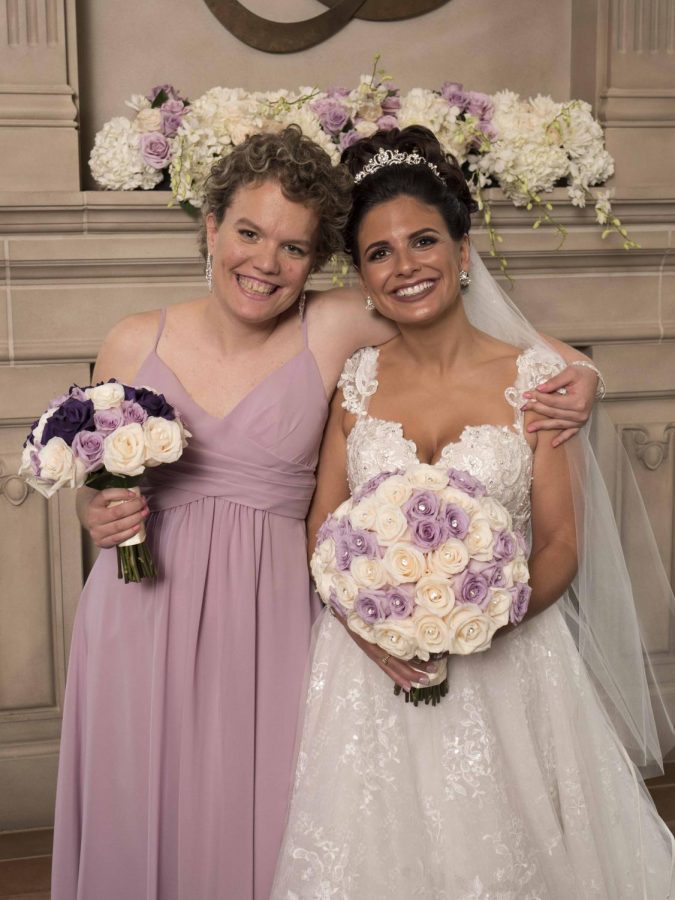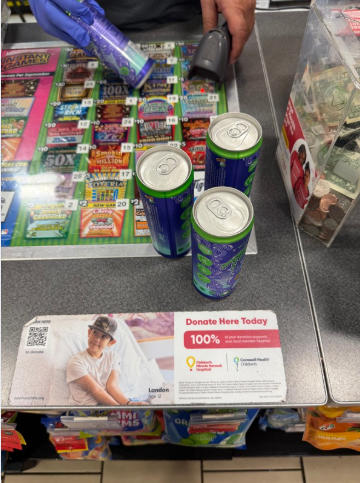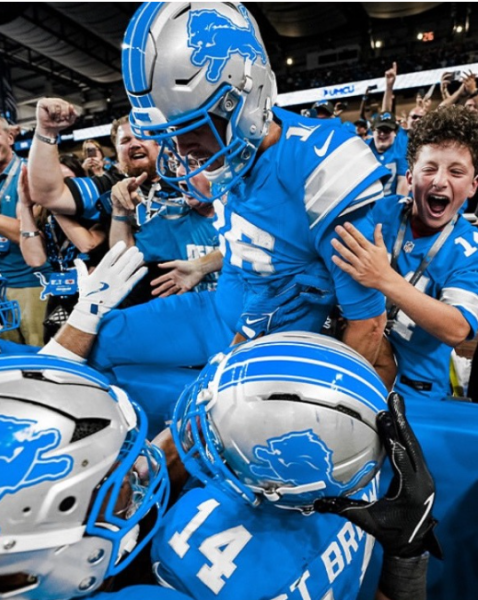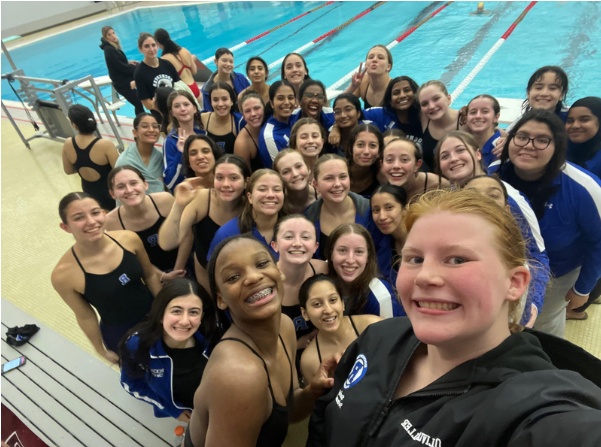It Hits Close To Home
November 21, 2019
A young woman whose brain was picked apart, completely paralyzed on her left side, recovered, but nevertheless has found her purpose in life.
Rochester High School Special Ed Teacher Gina Campbell—formerly known as Gina Belcastro— fell down a flight of stairs as a young child. No issues from the injury arose until she was 6 years of age. Seizures would come in spurts. Damage of her brain was increasing and medication was ineffective. School life was starting to worsen and confusion was enclosing on her parents and on her internal perception of wanting to fit in with her friends and peers.
“When this was going on, I was attending [St. Thecla Catholic] private school and they don’t really have the best resources to support special ed students because they don’t have to,” Mrs. Campbell said.
Individuals that fall under the Disabilities Education Act requires federal district funding to be used towards special education to provide services to students enrolled in private schools with district boundaries. However, private schools aren’t necessarily bound by state law to offer such services in the fullest extent but public schools are.
“I don’t think they really understood what was going on with me because they didn’t have a special ed teacher there,” she said.
Entering into her fifth year of elementary, she was newly enrolled into Crissman public elementary school. Instantly, her life shifted for the better. Until it didn’t. She had received math and reading support in the resource room at Crissman Elementary.
“I was doing things that I needed to do to get me caught up and that was a very good piece for me learning wise,” she said. “But then I felt like an outcast because my friends would see me leave the class early to go get help when they would stay. It made me feel like I was different.”
Moving forward, a week before her tenth birthday, the seizures had gotten the worst they had ever been and medications were still ineffective. The final resort was brain surgery.
“It went perfectly,” she said. “They were able to remove the part of my brain, a little piece that was causing the seizures. But when I was in recovery, I had a stroke.“
The stroke had left the whole left side of her body completely paralyzed. Mrs. Campbell mentioned an instance of going through a buffet line, the plate is held with your left hand and scoop food onto the plate with your right. Simple things such as that were a struggle for her as her left hand would slightly shake. Though, she did not let her disabilities get to the best of her.
“I used to be embarrassed,” Campbell said. “Now, I just embrace that I have a tremor.”
Furthering her education at Grand Valley State University in 2011, sophomore year, she had heard of a program through one of her classes by the name of Best Buddies. Best Buddies is a worldwide inclusion program that strives in “ending the social, physical and economic isolation of the 200 million people with intellectual and developmental disabilities (IDD).”
To join this program, Mrs. Campbell had to go through a whole matching process online where she filled out a survey about who she was and what her interests were. The buddies would do it too.
“That year I was matched with my buddy Mary,” she said. “We got matched because we love the same colors, love to watch movies, dance, and make desserts.”
While getting to know her buddy, to her surprise, she had learned that Mary had brain surgery the same year and age that she did. Mary would have seizures that were more significant than hers but had lessened with surgery.
“I got married last year and she was one of my bridesmaids,” Mrs. Campbell said. “She came over from the west side of the state and stood up in my wedding. It was very cool.”
When she went on to her work towards her masters degree at Oakland University, it occurred to her that OU didn’t offer the Best Buddies program. So, she contacted headquarters and is now an advisor for the Best Buddies program at OU. She is not able to have her own buddy, but she oversees the whole program and is active in finding ways to better the program for all.
This school year, 2019-2020, marks the fourth year that Mrs. Campbell has been teaching special ed for the Rochester Community School District. She has previously taught at Long Meadow Elementary, Reuther Middle, and is currently working at Rochester High full-time.
“Our students here go to the post high program after they leave high school,” she said. “Once they turn 18, they can join Best Buddies, so I’ll get to stay in touch with them through this program.”
Within the Cognitively Impaired Program (CI) at RHS, students learn the same common core state standards that typical students are learning from. They’re given the most basic point of each standard and apply it to their everyday curriculum to make what they’re learning meaningful. Common core standards include: math skills, literary skills, social skills, and daily life skills.
“We’re combining all of that together so that when they go out into the community, they can be integrated meaningfully, they can feel fulfilled, and they can just find joy in their life the way that they are satisfied,” Mrs. Campbell said.
It’s different for each class as to what students learn based on their specific needs and to further guide them into what they could do in their lives. There are also two main classes that are divided and composed of special ed teachers, Mrs. Dodge and Mrs. Campbell, along with multiple paraprofessionals and peer mentors.
“They offer me a new perspective on life because they’re all different in their own way,” she said. “They have their own challenges but they come with so many unique talents and their own outlook on life.”
RHS allows students to take a peer mentor class where they are either in Mrs. Dodge’s class or Mrs. Campbell’s class. Within each class, peer mentors are encouraged to be prepared, be present, and be engaged. Peer mentors have the ability to complete a bi-weekly journal assignment with given prompts and are also able to attend a weekly field trip to multiple locations taking place every Friday.
“You have to be mindful that there are going to be very challenging days and really fun days but I’m confident that everyone in this world is going to have to interact with someone different than themselves, right?” Mrs. Campbell said. “You have to learn different skills, different weaknesses, just ways of communicating.”
The most important form of communication that peer mentors have the ability of learning is Person First Language (PFL). Person First Language is a method of communication that is used when speaking of disabilities respectfully. Focus is placed on the qualities of the individual and who they are, not the issue that he or she has.
“Personally, I have a sister that had sensory awareness issues and went through occupational and listening therapy,” peer mentor and senior Brianna Mazur said. “I believe taking this class will greatly benefit me with my career in physical therapy if I happen to work with special needs in that process.”
The special ed program at RHS is open to anyone who wants to take the course. The most important aspect is to treat your peers as you would want to be treated yourself because they’re aware and want to fit in and be a part of the community equally as any other individual.
“The relationships make this class special,” Mrs. Campbell said. “Relationships with teachers, relationships with each other, paraprofessionals, and peer mentors. Everyone is so inclusive, understanding, patient, and together, we’re able to achieve so much more.”







